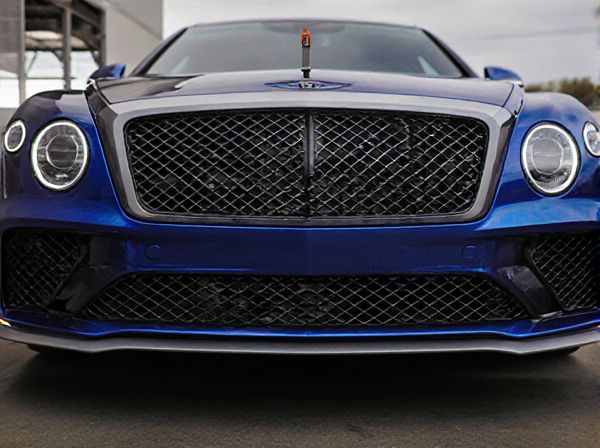
Photo illustration: Custom Grille vs Factory Grille
Custom grilles offer personalized designs and materials that enhance your vehicle's appearance and performance, unlike factory grilles which are mass-produced to meet standard specifications. Choosing a custom grille allows you to express your unique style and improve airflow or durability tailored to your needs. Factory grilles provide reliable, OEM-fit replacements that maintain your vehicle's original look and warranty compliance.
Table of Comparison
| Feature | Custom Grille | Factory Grille |
|---|---|---|
| Design Flexibility | High - Unique styles, colors, and materials available | Standard - Limited to manufacturer designs |
| Material Quality | Premium options like stainless steel, aluminum, carbon fiber | Standard automotive-grade plastic or metal |
| Cost | Higher - Custom fabrication and materials increase price | Lower - Mass-produced and included with vehicle |
| Installation | Requires professional installation for best fit | Simple - Designed for direct fit on vehicle |
| Warranty | Varies - Often limited or no warranty | Manufacturer-backed warranty included |
| Durability | Depends on materials used; can be more durable | Engineered for durability and impact resistance |
| Aesthetic Impact | High - Enhances vehicle uniqueness and style | Standard - Maintains original vehicle look |
Introduction to Custom and Factory Grilles
Custom grilles offer unique designs and personalized materials that enhance vehicle aesthetics and performance, often crafted from high-quality metals or mesh to provide improved airflow and durability. Factory grilles are standardized, mass-produced components designed to meet original equipment manufacturer (OEM) specifications, ensuring compatibility and maintaining the vehicle's warranty. Choosing between custom and factory grilles depends on preferences for style, functionality, and compliance with manufacturer standards.
Aesthetic Differences: Custom vs Factory Grilles
Custom grilles offer unique designs, materials, and finishes that enhance vehicle aesthetics by providing a personalized, aggressive, or luxury appearance compared to the standard factory grille. Factory grilles maintain the original design intent and brand identity, focusing on consistent quality and fit without customization options. The choice between custom and factory grilles significantly impacts a vehicle's visual statement, with custom options allowing for distinct style expression.
Material Quality and Durability Comparison
Custom grilles are often crafted from high-grade materials such as billet aluminum, stainless steel, or ABS plastic, offering enhanced corrosion resistance and superior durability compared to factory grilles, which typically use standard plastic or lower-grade metals. The precision engineering in custom grilles ensures a longer lifespan and better withstands harsh weather conditions, while factory grilles may degrade faster due to mass-production material compromises. Investing in a custom grille can significantly improve the vehicle's front-end protection and aesthetic appeal without sacrificing structural integrity.
Performance Impact of Grille Choices
Custom grilles enhance airflow compared to factory grilles, improving engine cooling and overall vehicle performance. Their design often reduces drag and increases air intake efficiency, leading to potential gains in horsepower and fuel economy. Factory grilles typically prioritize aesthetics and OEM standards, which may limit optimal ventilation and airflow dynamics.
Cost Analysis: Custom vs Factory Grilles
Custom grilles typically cost significantly more than factory grilles due to materials, labor, and design complexity, with prices ranging from $300 to over $1,000 compared to factory grilles averaging $100 to $400. Factory grilles offer a cost-effective, OEM-fit solution ideal for budget-conscious buyers, while custom grilles provide enhanced aesthetics and personalization at a premium price. Long-term value should consider durability and style preferences, as custom grilles may increase vehicle appeal but require higher initial investment.
Installation and Compatibility Considerations
Custom grilles often require precise measurements and may need modifications to fit specific vehicle models, making installation more time-consuming compared to factory grilles designed for seamless compatibility. Factory grilles ensure straightforward installation as they come pre-fitted to the vehicle's existing mounting points and maintain original structural integrity. Compatibility considerations include verifying grille size, mounting hardware, and sensor integration, especially for advanced driver-assistance systems commonly supported by factory grilles.
Maintenance and Longevity Factors
Custom grilles often require more frequent maintenance due to their unique materials and finishes, which may not withstand harsh weather conditions as well as factory grilles. Factory grilles are typically designed with durable, corrosion-resistant materials tailored for long-term use and minimal upkeep. Longevity factors favor factory grilles given their standardized production quality, while custom grilles offer aesthetic appeal but potentially shorter lifespan without proper care.
Resale Value Implications
Custom grilles can enhance a vehicle's aesthetic appeal and uniqueness, potentially increasing its resale value among niche buyers who seek personalization. Factory grilles maintain the car's original look, often preserving broader market appeal and ensuring greater resale value for buyers prioritizing authenticity and warranty compliance. Choosing between custom and factory grilles directly impacts resale value depending on buyer preferences and market demand for originality versus customization.
Popular Trends in Grille Customization
Custom grilles dominate popular trends in vehicle modification due to their unique designs, superior materials, and enhanced airflow, offering a personalized aesthetic beyond standard factory grilles. Enthusiasts increasingly prefer custom options featuring billet aluminum, mesh patterns, and integrated lighting, which elevate both style and functionality. Factory grilles remain favored for original fitment and warranty compliance but lack the diverse, bold customization options driving current market demand.
Choosing the Right Grille for Your Vehicle
Choosing the right grille for your vehicle involves balancing style, durability, and function. Custom grilles offer unique designs and materials tailored to your taste, enhancing your vehicle's appearance and potentially improving airflow, while factory grilles provide tested durability, perfect fit, and maintain original vehicle aesthetics. Consider your driving needs, budget, and desired look to decide whether a distinctive custom grille or a reliable factory grille best suits your vehicle.
 caratoz.com
caratoz.com